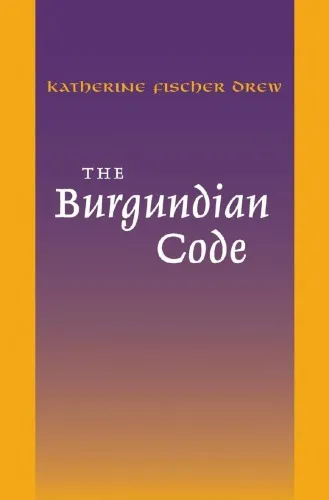The Burgundian Code: Book of Constitutions or Law of Gundobad; Additional Enactments
5.0
Reviews from our users

You Can Ask your questions from this book's AI after Login
Each download or ask from book AI costs 2 points. To earn more free points, please visit the Points Guide Page and complete some valuable actions.Introduction to 'The Burgundian Code: Book of Constitutions or Law of Gundobad; Additional Enactments'
"The Burgundian Code: Book of Constitutions or Law of Gundobad; Additional Enactments" is a remarkable historical document that offers invaluable insights into the early medieval legal systems of the Burgundian Kingdom in the late 5th and early 6th centuries CE. Translated and annotated by Katherine Fischer Drew, this work illuminates the intricacies of civil law, societal norms, and the transition from Roman to barbarian governance in post-Roman Europe. This introduction provides a detailed overview of the book, highlights its key contributions to legal history, and explains why it remains an essential resource for scholars, historians, and legal experts.
Detailed Summary of the Book
At its core, "The Burgundian Code" is a compilation of laws attributed to Gundobad, the ruler of the Burgundian Kingdom, and his son and successor, Sigismund. It provides a fascinating glimpse into the codification of legal principles in a society transitioning from tribal customs to a more centralized administration influenced by Roman legal traditions. The text delves into various aspects of law, including property disputes, inheritance rights, criminal justice, familial obligations, and class distinctions.
The collection is divided into two main sections. The "Book of Constitutions" reflects the systematic legal efforts initiated by Gundobad to address both the Roman population under his rule and the Burgundians themselves, while the "Additional Enactments" serve as revisions and supplementary laws introduced by later rulers. Together, they represent a dynamic legal framework that evolves over time. What makes the Burgundian Code particularly notable is its inclusiveness in dealing with both its Roman subjects and Burgundian elites, showcasing the kingdom’s efforts to balance traditional Germanic law with the remnants of Roman jurisprudence.
Key Takeaways
- The Burgundian Code reflects the integration of Roman legal practices into Germanic tribal law, offering a unique lens into cultural assimilation in the early medieval period.
- It provides insights into economic and social structures, especially the relationship between land ownership and class hierarchies.
- The laws emphasize familial obligations and inheritance, showcasing the significance of kinship ties in medieval governance and society.
- Criminal law under the Code reveals a preference for compensation or wergild over physical punishment, highlighting shifting attitudes toward justice and reparation.
- The Code’s adaptation to changing societal needs underscores the evolution of legal systems in response to political and demographic shifts.
Famous Quotes from the Book
"Let it be known that no one shall take the law into their own hands. The judgment of disputes must be left to appointed judges to preserve peace within the kingdom."
"A man’s property, acquired through honest labor or inheritance, shall remain his own, and no one—not even a king—shall deprive him of it without lawful cause."
"The wergild of each man shall reflect not only his social rank but also the gravity of the offense, for justice must account for both honor and crime."
Why This Book Matters
"The Burgundian Code: Book of Constitutions or Law of Gundobad; Additional Enactments" is much more than a legal text. It is a window into the dynamic and complex societal structures of a post-Roman world reshaped by migration, conquest, and cultural fusion. The Burgundian Kingdom was a microcosm of early medieval Europe, where Roman traditions and Germanic customs intertwined to create a distinctive legal and cultural identity.
For scholars of legal history, this work represents one of the earliest examples of a codified legal system produced by a Germanic people. It is pivotal for tracing the origins of European legal systems and understanding how laws adapted to accommodate diverse populations under a single government.
This book also holds significance for students of cultural history. It vividly demonstrates how law can serve as a tool for shaping identity and uniting disparate peoples, as well as how legal codes can act as repositories of the values, priorities, and conflicts of their time. Katherine Fischer Drew’s meticulous translation and insightful commentary add depth and clarity to the study of this foundational legal text, making it accessible to modern audiences.
In essence, "The Burgundian Code" bridges the gap between past and present, illustrating the timeless importance of law in structuring societies and ensuring justice. It continues to inspire and inform, inviting readers to reflect on the evolution of governance and human rights.
Free Direct Download
Get Free Access to Download this and other Thousands of Books (Join Now)
For read this book you need PDF Reader Software like Foxit Reader


